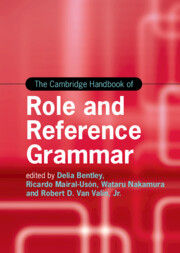Book contents
- The Cambridge Handbook of Role and Reference Grammar
- Cambridge Handbooks in Language and Linguistics
- The Cambridge Handbook of Role and Reference Grammar
- Copyright page
- Dedication
- Contents
- Figures
- Tables
- Contributors
- Pedagogical Guide to The Cambridge Handbook of Role and Reference Grammar
- Introduction
- Part One Overview
- Part Two Topics in RRG: Simple Sentences
- Part Three Topics in RRG: Complex Sentences
- Part Four Applications of RRG
- 17 Role and Reference Grammar and Diachronic Syntax
- 18 Functional Acquisition Processes in Child Language
- 19 Grammatical Aspects of Language Processing in the Brain
- 20 Formalization of RRG Syntax
- 21 Computational Implementation and Applications of Role and Reference Grammar
- Part Five Grammatical Sketches
- Index
- References
18 - Functional Acquisition Processes in Child Language
Links to Role and Reference Grammar
from Part Four - Applications of RRG
Published online by Cambridge University Press: 08 June 2023
- The Cambridge Handbook of Role and Reference Grammar
- Cambridge Handbooks in Language and Linguistics
- The Cambridge Handbook of Role and Reference Grammar
- Copyright page
- Dedication
- Contents
- Figures
- Tables
- Contributors
- Pedagogical Guide to The Cambridge Handbook of Role and Reference Grammar
- Introduction
- Part One Overview
- Part Two Topics in RRG: Simple Sentences
- Part Three Topics in RRG: Complex Sentences
- Part Four Applications of RRG
- 17 Role and Reference Grammar and Diachronic Syntax
- 18 Functional Acquisition Processes in Child Language
- 19 Grammatical Aspects of Language Processing in the Brain
- 20 Formalization of RRG Syntax
- 21 Computational Implementation and Applications of Role and Reference Grammar
- Part Five Grammatical Sketches
- Index
- References
Summary
This chapter proposes a functional theory of language acquisition based on the idea that children utilize their understanding of cognitive and communicative principles to construct a grammar that integrates semantic and pragmatic notions. The chapter explores child language data that are relevant to such issues as how layered clause structure, operator projection, predicate structure and grammatical relations are acquired within a communication-and-cognition framework. In showing how the language acquisition data map to the Role and Reference Grammar framework, the chapter includes contrasts with alternative theories, such as autonomous syntax theory. From the perspective of conceptual development, the infant-toddler is viewed as a relatively proficient information processor with the capacity to discover fundamental linguistic relationships, in the spirit of the theory of Operating Principles (Slobin 1985).
Keywords
- Type
- Chapter
- Information
- The Cambridge Handbook of Role and Reference Grammar , pp. 666 - 692Publisher: Cambridge University PressPrint publication year: 2023

